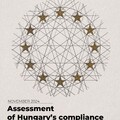Despite relevant measures within the conditionality mechanism and the RRP to carry out and even increase the number of public consultations (Milestone 235), this week the Hungarian government has again proven that there is no serious commitment behind its promises.
Step 1: Weakening the Transparency of Local Governance
On 27 April 2023, citizens learned from the Hungarian Gazette that the Government has issued a decree which abolishes an important form of public participation at the local level.
The law on Local Governance provides that municipalities should hold a public hearing at least once in a calendar year (Art 54). At the public hearing, the citizens and local CSOs may ask questions and make recommendations concerning local public affairs. The law also sets that response to such recommendations or questions should be given right at the public hearing or within fifteen days after the hearing at the latest. Due to a recent government decree, these statutory rules will not apply from 29 April.
Invoking emergency powers related to the war in Ukraine, the Hungarian government set in Government Decree No. 146/2023 that local governments are not obliged to ensure citizens’ in person participation at the hearing. Setting detailed rules for any citizens' participation are left to the municipalities themselves. Consequently, municipalities that wish to liberate themselves from public scrutiny and critical questions can therefore exclude citizens from the hearing by a local decree.
As the Government Decree includes no explanatory memorandum, no reason can be identified that could justify the law. Since the war in Ukraine has no, or no significant effect on the operation of Hungarian municipalities, it is obvious that the government misused its emergency powers again when issuing special legislation, avoiding any consultation and approval by the parliament.
The public hearing is a form of a council session, which should be open to the public. The Kúria, which is the highest court of Hungary, has emphasized the principle of publicity in several decisions:
‘public power, including the exercise of local public power, is the basis of democratic functioning, one of the cornerstones of the rule of law (...) Therefore, the principle of publicity of the council meetings prevails as a general rule (...). Publicity means partly the participation in the council meetings and partly the possibility of getting access to the information made by council. These two together give rise to publicity and, as a consequence, the possibility of access to public interest data, which also creates the possibility of exercising control over the functioning.’ (Decision No. Köf.5.020/2016/3.)

Public Consultation on the CATL Battery Plant Constructed in Debrecen (photo: dehir.hu)
Looking back at the events of last months, there can be no doubt that the Government’s intent was to silence citizens’ initiatives that were recently formed against large investments backed by the state. In a number of instances local residents have used municipal forums to protest against the construction of battery factories in Hungarian cities. Critical voices and persistence of the protests outside of the capital were clearly against the interests of the government. From now on, municipalities can easily get rid of their own citizens in hearings if they wish so.
Step 2: Hijacking the Law-making Procedure
On 3 March 2023, the Government submitted a bill to the Parliament on digitizing asset declarations to fulfill a milestone of the RRP. The submission of the bill had not been preceded by any public consultation or a consultation with the newly established Anti-Corruption Task Force.
Bill T/3131 included provisions to give a facelift to the asset declaration system by creating a digital platform for the declarations of MPs and high level decision makers. We assessed the bill as part of a joint report published together with partner CSOs on the fulfillment Hungary’s RRF milestones that were due end of March.
On 27 April, the Committee on Legislation dominated by the MPs of the government submitted changes to the bill, replacing the entire content of it by removing digital asset declarations and inserting the provisions of the judicial reform - instead of introducing a new bill*. This is a breach of the House Rules of the Parliament. The explanatory memorandum of the Committee does not even try to justify why this odd move in the law making procedure was necessary. Nor is there any information on the disappearance of the provisions on asset declarations either, which have already been discussed in the plenary and the judicial committee and which are RRF milestones (172) and were part of the remedial measures in the conditionality mechanism. With this move the government obviously aimed to avoid any further consultation of the judicial reform with Hungarian stakeholders.

Amendment 1 - the Title: Instead of the "Amendment of Asset Declaration Rules in the Interest of Reaching an Agreement with the EC", "Amendments of Laws on the Judiciary in Conncection with the RRP".
* Update: A detailed analyis of this issue was published by Amnesty International Hungary, EKINT and the Hungarian Helsinki Committee on 29 April.
Címkék: english EU conditionality
Szólj hozzá!
A bejegyzés trackback címe:
Kommentek:
A hozzászólások a vonatkozó jogszabályok értelmében felhasználói tartalomnak minősülnek, értük a szolgáltatás technikai üzemeltetője semmilyen felelősséget nem vállal, azokat nem ellenőrzi. Kifogás esetén forduljon a blog szerkesztőjéhez. Részletek a Felhasználási feltételekben és az adatvédelmi tájékoztatóban.





